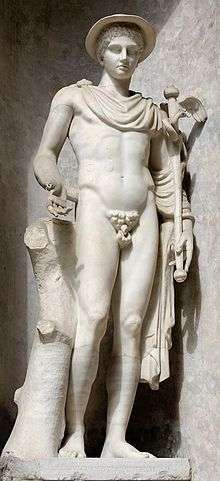Hermes
English
Etymology
From the Ancient Greek Ἑρμῆς (Hermês), itself of disputed meaning and origin, possibly of non-Indo-European substrate or from Proto-Indo-European *ser- (“to bind, put together”).
Pronunciation
- (US) IPA(key): /ˈhɝmiːz/
Proper noun

Hermes
Translations
|
|
Czech
Finnish
Declension
| Inflection of Hermes (Kotus type 41/vieras, no gradation) | |||
|---|---|---|---|
| nominative | Hermes | — | |
| genitive | Hermeen | — | |
| partitive | Hermestä | — | |
| illative | Hermeeseen | — | |
| singular | plural | ||
| nominative | Hermes | — | |
| accusative | nom. | Hermes | — |
| gen. | Hermeen | ||
| genitive | Hermeen | — | |
| partitive | Hermestä | — | |
| inessive | Hermeessä | — | |
| elative | Hermeestä | — | |
| illative | Hermeeseen | — | |
| adessive | Hermeellä | — | |
| ablative | Hermeeltä | — | |
| allative | Hermeelle | — | |
| essive | Hermeenä | — | |
| translative | Hermeeksi | — | |
| instructive | — | — | |
| abessive | Hermeettä | — | |
| comitative | — | — | |
Latin
Alternative forms
- Herma
Etymology
From Ancient Greek Ἑρμῆς (Hermês).
Pronunciation
- (Classical) IPA(key): /ˈher.meːs/, [ˈhɛr.meːs]
Noun
Hermēs m (variously declined, genitive Hermae or Hermētis); first declension, third declension
- Hermes.
- A rectangular pillar or pedestal bearing a bust; a herm.
- Hermes Trismegistus.
Declension
The first declension paradigm applies to all senses. The third declension paradigm is an exception that comes from Medieval Latin and is principally used to decline the name of Hermes Trismegistus when there is a wish to congrue with established Medieval Latin derivations such as hermeticus; but note that the figure of Hermes Trismegistus dates back to Antiquity, and that the existence of this special grammatical treatment has no parallel in Greek.
First declension, masculine Greek type with nominative singular in -ēs.
| Case | Singular | Plural |
|---|---|---|
| Nominative | Hermēs | Hermae |
| Genitive | Hermae | Hermārum |
| Dative | Hermae | Hermīs |
| Accusative | Hermēn | Hermās |
| Ablative | Hermē | Hermīs |
| Vocative | Hermē | Hermae |
Third declension.
| Case | Singular |
|---|---|
| Nominative | Hermēs |
| Genitive | Hermētis |
| Dative | Hermētī |
| Accusative | Hermētem |
| Ablative | Hermēte |
| Vocative | Hermēs |
Derived terms
- Hermaeum
- hermēticus (in connection with sense 3)
References
- Hermes in Charlton T. Lewis and Charles Short (1879) A Latin Dictionary, Oxford: Clarendon Press
- Hermes in Gaffiot, Félix (1934) Dictionnaire Illustré Latin-Français, Hachette
Polish
Pronunciation
- IPA(key): /ˈxɛr.mɛs/
audio (file)
Declension
| singular | |
|---|---|
| nominative | Hermes |
| genitive | Hermesa |
| dative | Hermesowi |
| accusative | Hermesa |
| instrumental | Hermesem |
| locative | Hermesie |
| vocative | Hermesie |
Portuguese

Etymology
From Ancient Greek Ἑρμῆς (Hermês), itself of unknown meaning and origin.